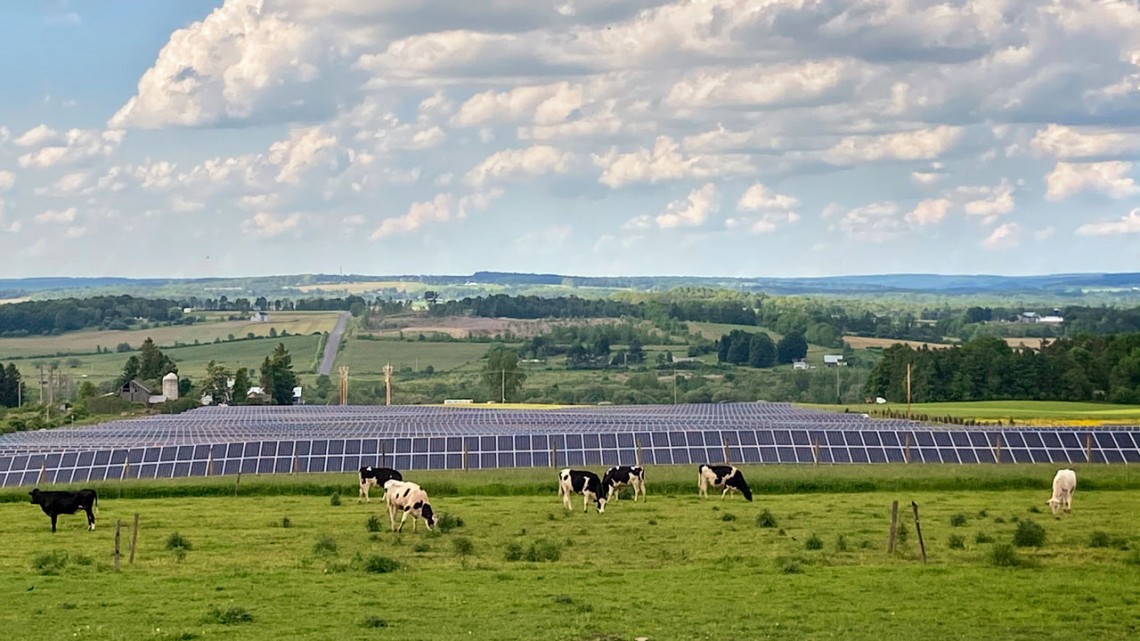
Solar arrays on a farm in Dryden, New York.
Cornell launches New York solar farm study
By Matt Hayes
New York state has set ambitious goals to wean its economy off fossil fuels by 2050 while cutting greenhouse gas emissions by 85%. To help reach those goals, Cornell researchers are studying ways the state’s mix of sun and farmland will factor into plans.
Allison Chatrchyan and David Kay, senior research and extension associates in the College of Agriculture and Life Sciences’ Department of Global Development, are studying solar leasing on farmland in New York to better understand the economic, legal and community issues associated with solar energy initiatives.
The three-year project launched in June with funding from the U.S. Department of Agriculture’s National Institute of Food and Agriculture. The goal is to study the risks and opportunities of solar energy production on agricultural lands in New York, Maryland and Oklahoma. The overall project will be led by the University of Maryland, with Cornell receiving $170,000 to study impacts in New York. The findings will inform educational materials for landowners, farmers and attorneys, with practical tips related to solar energy contracts.
According to the researchers, the project aims to provide rural communities and landowners with information to navigate emerging opportunities and potential conflicts associated with large solar energy projects on farmland.
“Because large scale solar development hasn’t happened yet in New York, the implications about its significance are mostly speculative,” said Kay, the project director at Cornell. “We expect a systematic study of leases to offer rare insights into the economic, social and environmental implications we should expect in three states at different stages of solar development.”
Large solar energy installations can cover 1,000 acres or more, and solar companies often seek out flat, cleared land used for agriculture for these sites. Rural areas with abundant farmland are far less densely populated than downstate areas, but there are considerable challenges to negotiating with landowners and turning agricultural land into solar farms.
As of March, approximately 40 large solar facilities are under state-level permit review. These proposed facilities could generate upwards of 9 gigawatts of electricity. Most of these projects are concentrated in the state’s “solar belt,” stretching from western New York’s dairy country to the outskirts of the Adirondacks.
“Large solar farms can bring a needed source of diverse income to our New York farmers and rural landowners, and reduce greenhouse gas emissions that warm the climate,” Chatrchyan said. “But both the state and farm communities are wondering how to balance these benefits with protection of valuable farmland. Research-based guidance from Cornell will help landowners make better decisions.”
In a research paper from Cornell’s Community and Regional Development Institute, Kay and co-authors Roberta Nilson and Richard Stedman note that it’s highly unlikely that all the facilities will be constructed. But the ways that stakeholders – communities, farmers, developers and state politicians – cooperate will determine how solar energy fits into the state’s climate and electricity generation goals.
“Given New York state’s pioneering and ambitious energy policies, its ability to navigate these challenges and meet these goals will set the stage far beyond the state’s borders,” the researchers wrote in the paper.
Cornell Cooperative Extension educators are being increasingly contacted about emerging issues with solar energy and land rights. As part of the project, Chatrchyan and Kay will implement a train-the-trainer approach to educate extension staff in New York. The team will provide guidance on legal and economic issues involved in solar energy leases and resources available for farmers, landowners, agricultural service providers and state officials.
Matt Hayes is associate director for communications for Global Development in the College of Agriculture and Life Sciences.
Media Contact
Get Cornell news delivered right to your inbox.
Subscribe
